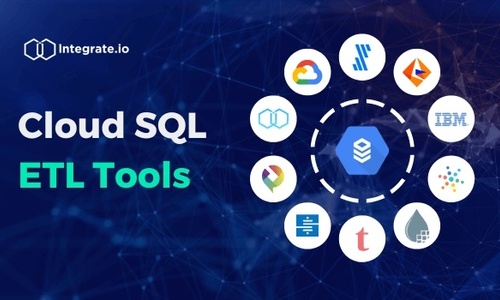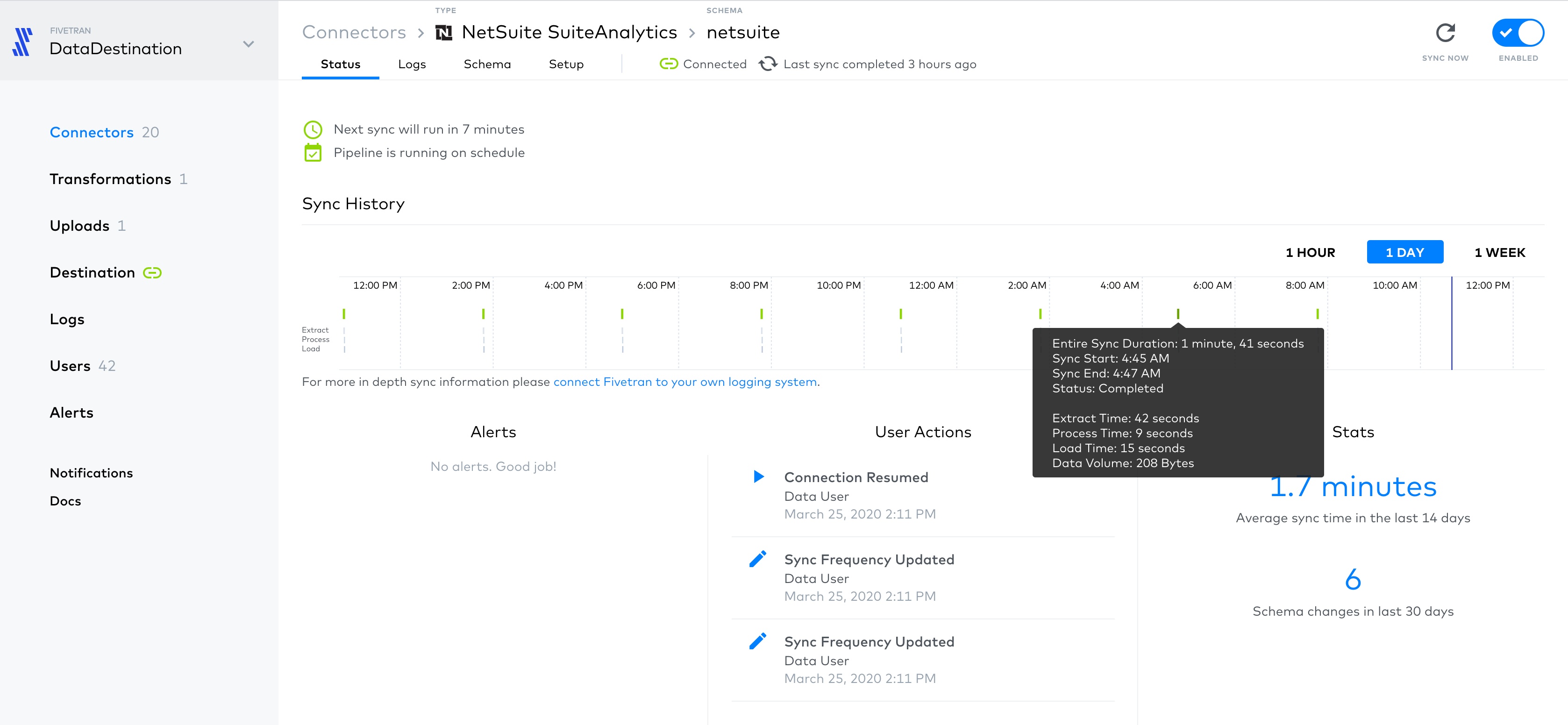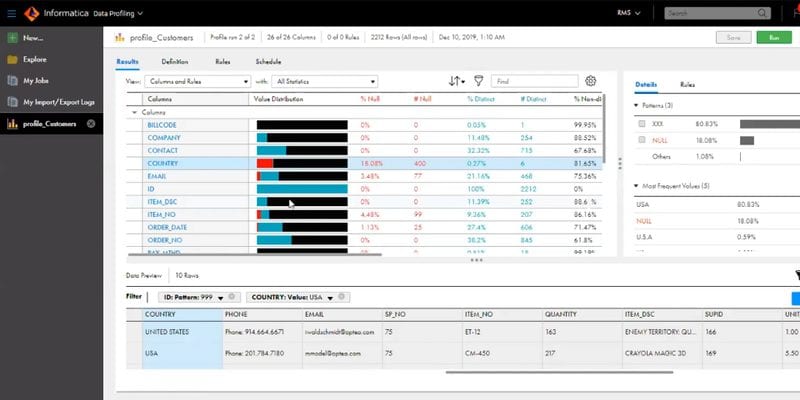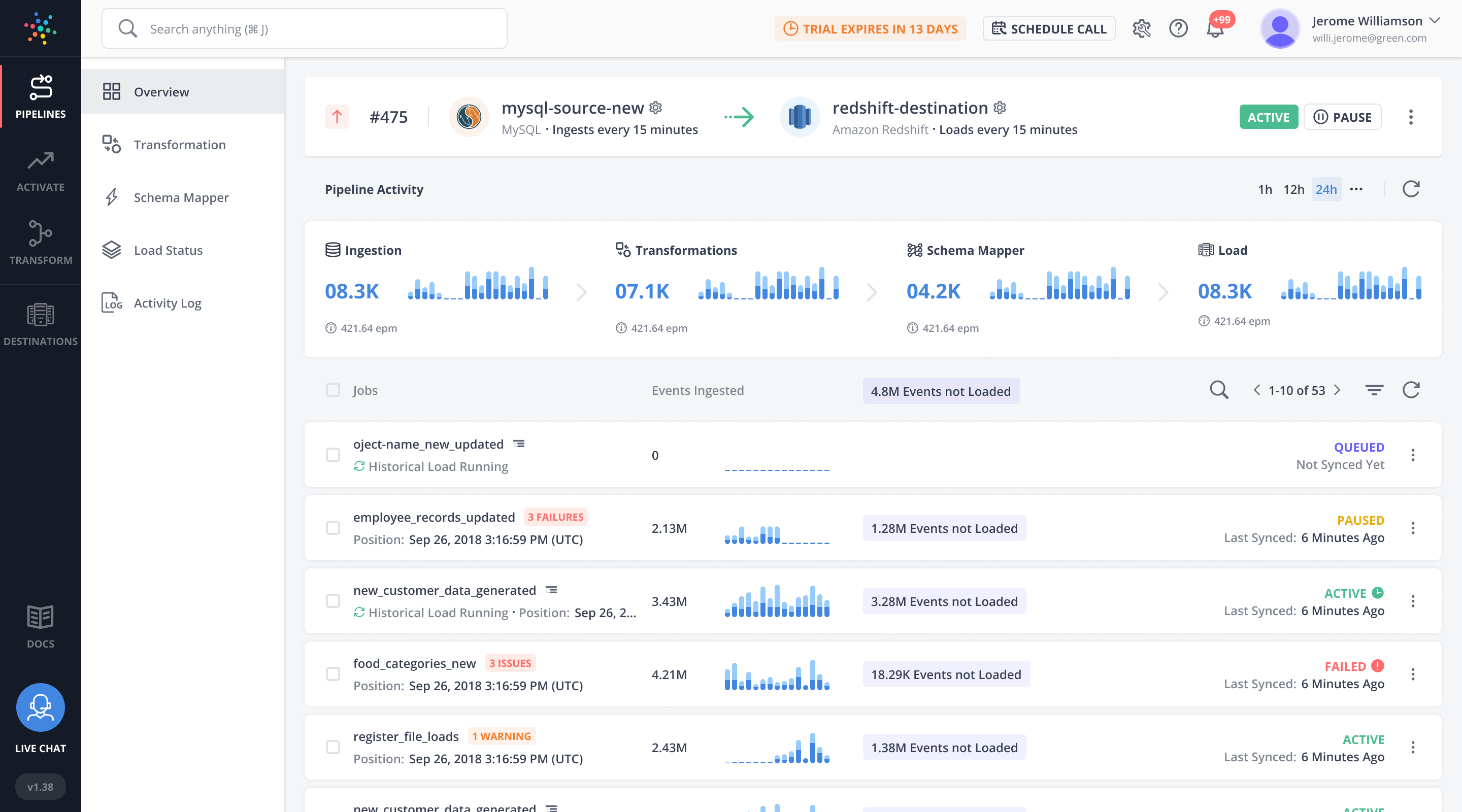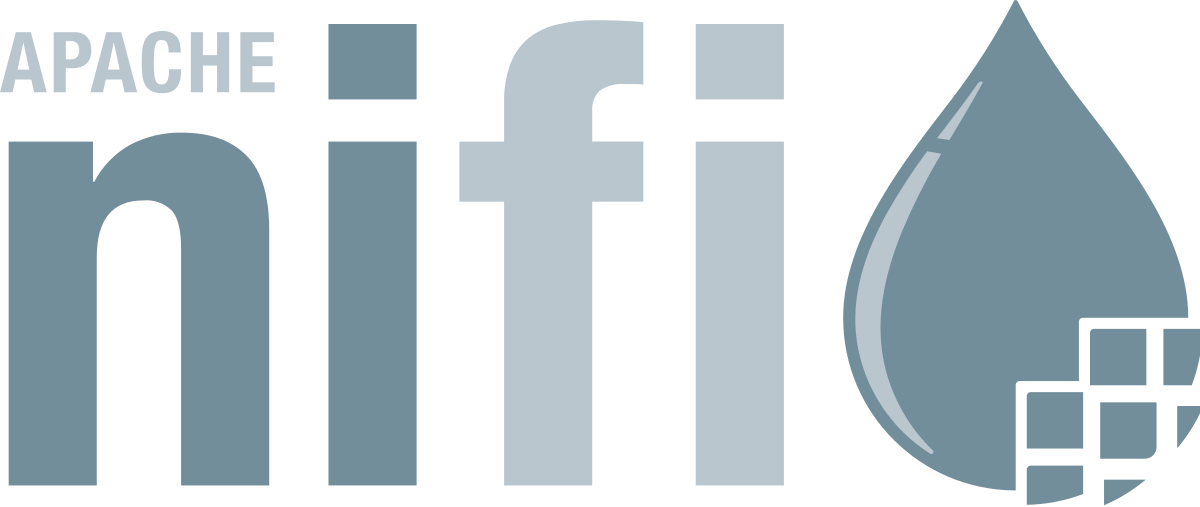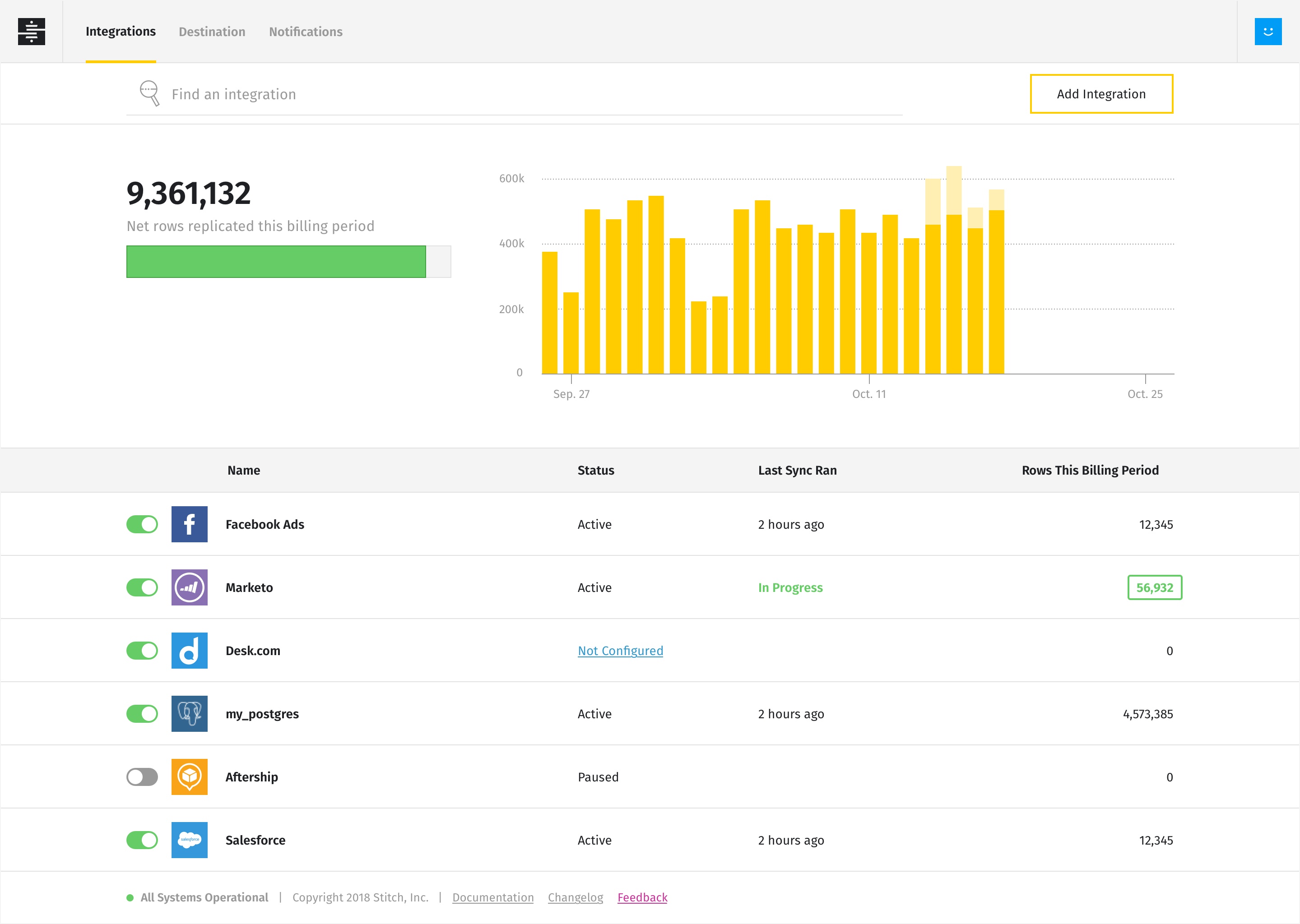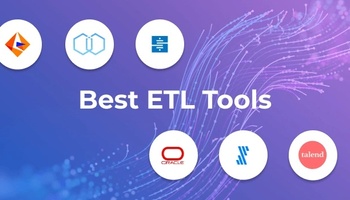Data and its sources are expanding fast. Businesses need effective extract, transform, and load (ETL) tools to process data, clean it up, and use it to make data-driven decisions. And many organizations require ETL tools that play well with Google Cloud SQL.
Here are the key things to know about Google Cloud SQL ETL tools:
- The extract, transform, and load process is critical for making sense of your data as it transforms data into a consistent format and prepares it for analysis.
- ETL tools are essential for optimizing data processing in Google Cloud SQL, as they automate data extraction from various sources.
- There are various Google Cloud SQL ETL tools on the market today, including Integrate.io, Google Cloud Data Fusion, Fivetran, and others.
- The right ETL tools will be easy to use with robust data processing capabilities and built-in connectors that link directly to Google Cloud SQL.
- Key differences between these tools revolve around pricing, the number of pre-built connectors, and usability.
In this article, we cover the best Google Cloud SQL ETL tools you can use to speed up data integration while reducing errors and ensuring the highest data quality.
What Is Google Cloud SQL?
Google Cloud SQL is a fully-managed relational database service provided by Google Cloud Platform. It offers a simple and efficient way to run, manage, and scale databases in the cloud, supporting MySQL, PostgreSQL, and SQL Server.
Google Cloud SQL can serve as a potential destination for your data pipelines. Therefore, choosing the right ETL tool that can extract, transform, and load data to it can significantly impact the efficiency of your data integration process.
What Are Google Cloud SQL ETL Tools?
Google Cloud SQL ETL tools are platforms used to perform extract, transform, and load processes involving Google Cloud SQL databases.
These tools help in extracting data from various sources (such as databases, APIs, file systems, etc.), transforming the data (cleaning, filtering, aggregating, and other operations) to make the data suitable for analysis, and then loading the transformed data into a Google Cloud SQL database.
Some ETL tools, like Integrate.io, can also run reverse ETL processes. This means they can extract data from your Google Cloud SQL database, transform it, and then load it into other apps that are part of your workflow.
How to Evaluate Google Cloud SQL ETL Tools
Choosing the right Google Cloud SQL ETL tool can help your business streamline the data integration process, thus saving time and resources. Here’s what to consider before picking a tool.
Ease of Use and No-Code Capabilities
The user-friendliness of an ETL tool is a significant factor to consider. Tools that offer intuitive interfaces and no-code operation can dramatically reduce the learning curve and speed up the ETL process while reducing the likelihood of errors.
Pre-Built Connectors
These connectors make it easy to extract data from and load it into various systems without writing custom code. Look for a tool that offers connectors to the specific tools you use in your organization, whether data warehouses, databases, cloud storage platforms, APIs, or other data sources and destinations.
Data Processing Capabilities
Traditional ETL processes may not be sufficient for all use cases. Some companies may benefit from ELT processes, where the data is loaded into the destination system before being transformed.
CDC capabilities can also be necessary for real-time data integration scenarios, where changes in the source data need to be immediately reflected in the destination system. Choose a tool that offers the right combination of these capabilities for your needs.
1. Integrate.io
Rating: 4.3/5 (G2)
Key Features:
- ETL and reverse ETL: Integrate.io supports traditional ETL and reverse ETL processes, providing flexibility for diverse data operations.
- CDC: Integrate.io ensures real-time data updates, instantly mirroring any changes in the source app with your Google Cloud SQL database.
- Data observability: Through data observability features, you can easily keep an eye on your data with free monitoring and alerts.
- No-code/Low-code: With its user-friendly interface, Integrate.io allows technical and non-technical users to create and manage ETL processes without writing code.
- Pre-built connectors: Integrate.io offers pre-built connectors for various data sources and destinations, including a specific connector for Google Cloud SQL, simplifying the data extraction and loading process.
Integrate.io is an ETL tool that stands out for its features and ease of use. Its no-code/low-code interface makes it accessible to technical and non-technical users, significantly speeding up the ETL process and reducing the likelihood of errors.
The platform comes with hundreds of pre-built connectors for a wide range of data sources and destinations, including a connector for Google Cloud SQL. This means you can easily extract data from or load data into your Google Cloud SQL database without writing custom code.
Integrate.io supports both ETL and reverse ETL processes, allowing you to extract data from various sources, transform it, and load it into a destination, or vice versa. It also features ELT and CDC functionalities, so you can rest assured you'll only need a single platform for all data integration scenarios.
Integrate.io pricing is tailored exactly to each client's needs and requirements with a usage-based component couple with features and functionality. Clients choose which level of platform usage they will require and then which features and functionality to create a custom plan to fit their use case.
2. Google Cloud Data Fusion
Rating: 5/5 (G2)
Key Features:
- Point-and-click interface: Quickly deploy ETL/ELT data pipelines with little to no coding required.
- Pre-configured connectors and transformations: Easily connect to various data sources and perform complex data transformations with over 150+ pre-configured connectors.
- Natively integrates with Google Cloud services: Seamlessly connect all your Google Cloud services with native integration.
Google Cloud Data Fusion is a fully managed, cloud-native data integration service that allows users to build and manage ETL and ELT data pipelines at any scale. It's designed to facilitate the process of data integration, transformation, and analysis, making it a powerful tool for businesses dealing with large volumes of data.
New customers receive $300 in free credits to spend on Data Fusion, and all customers get the first 120 hours of pipeline development free per month, per account.
3. Fivetran
Rating: 4.2/5 (G2)
Key Features:
- 300+ pre-built connectors: Fivetran offers a wide range of pre-built connectors, allowing users to connect to various data sources without writing code.
- Automated schema drift handling: Automate many of the complex aspects of data management to reduce the workload of data engineers.
- CDC capabilities: Ensure efficient and low-impact data movement between various sources and Google Cloud SQL databases.
Fivetran is an ELT platform designed to streamline the process of moving data across cloud data platforms, apps, and databases. Its integration with Google Cloud SQL allows for seamless data ingestion from various data sources to your database.
The platform’s focus on automation and ease of use, combined with its feature set, makes it a compelling choice for businesses looking to streamline their data operations.
As for pricing, Fivetran offers a limited free plan and then charges based on usage.
4. Informatica
Rating: 4.4/5 (G2)
Key Features:
- Universal connectivity: Integrate data from any source, whether on-premise or from SaaS applications.
- Data observability: Informatica’s AI and ML algorithms automate resource allocation and data orchestration.
- Drag-and-drop UI: Quickly create data pipelines with a user-friendly interface.
Informatica is a data integration platform that streamlines the ETL process. It can automate the movement and transformation of data, ensuring your Google Cloud SQL database is always up-to-date and ready for analysis.
Whether you're migrating data, consolidating applications, or setting up a data warehouse, Informatica can help streamline your operations and improve the efficiency of your data management.
Through Informatica's consumption-based pricing model, you'll pay for what you need. This enables you to scale up or down as your needs change.
5. IBM DataStage
Rating: 4/5 (G2)
Key Features:
- Parallel processing: Ensure the platform can handle large volumes of data and complex data operations.
- Pre-built functions: The prebuilt functions can speed up development.
- Visual framework: DataStage provides a user-friendly interface for creating jobs that move data from sources to target systems.
IBM DataStage is a data integration component of the IBM InfoSphere Information Server that supports both ETL and ELT processes. It allows direct connection to enterprise applications as sources or targets, ensuring the data's relevance and accuracy.
The platform provides pre-built functions to reduce development time and improve the consistency of design and deployment.
In terms of pricing, IBM DataStage offers various options depending on your needs. For example, IBM DataStage as a Service starts at $1.75/Capacity Unit-Hour (CUH).
6. Hevo Data
Rating: 4.3/5 (G2)
Key Features:
- Pre-load and post-load transformations: Hevo allows you to clean, format, standardize, or filter data on the fly (pre-load) and prepare your data for analytics as soon as it lands in the warehouse (post-load).
- Hevo API: Trigger pipelines or perform pipeline actions programmatically by integrating Hevo directly into your data workflows.
- Reliability and security: Hevo offers a fault-tolerant architecture that ensures zero data loss, low latency, and compliance with security certifications.
Hevo Data is a data integration platform that helps businesses create data pipelines. It features pre-load transformations that let you format data on the fly and override auto schema mapping to control your data before it reaches your Google Cloud SQL database.
One of Hevo's key features is its Automated Schema Management, which automatically creates the destination schema as per the source and keeps your destination in sync regardless of how the source data changes.
Hevo offers a free plan with limited functionality and two paid plans with pricing based on usage.
7. Apache NiFi
Rating: 4.2/5 (G2)
Key Features:
- Browser-based user interface: Apache NiFi offers a seamless browser-based interface for design, control, feedback, and monitoring of data flows.
- Dynamic prioritization: Allows runtime modification of flow configuration and back pressure control, ensuring efficient data operations.
- Secure communication: NiFi supports standard protocols for encrypted communication, including TLS and SSH, and offers multi-tenant authorization and policy management.
Apache NiFi is a powerful system that processes and distributes data across various sources and destinations. One of its key features is data provenance tracking, which provides a complete information lineage from the beginning of the data pipeline to the end, ensuring transparency and traceability.
When integrated with Google Cloud SQL, Apache NiFi can automate and streamline your ETL processes. It can extract data from various sources, transform it according to your business needs, and load it into your Google Cloud SQL database.
Apache NiFi is open source, so you can download it for free.
8. Talend
Rating: 4.3/5 (G2)
Key Features:
- Wide range of connectors: Talend offers over 1,000 connectors and components to connect virtually any data source with any data environment.
- API design and creation: Design, test, and create APIs for data sharing, promoting efficient data distribution.
- Flexible data integration: Access data behind secure firewalls, in data centers, or in secure cloud environments.
Talend is a data integration platform that allows you to connect and manage all your data. It offers a wide range of connectors and components, enabling you to connect virtually any data source with any data environment, whether in the cloud or on-premises.
With its drag-and-drop interface, you can easily develop and deploy reusable data pipelines without writing a single line of code. Talend’s pricing plans are mainly based on features, but they scale with usage. For more detailed pricing, you'll need to contact the sales team.
9. Stitch
Rating: 4.5/5 (G2)
Key Features:
- No-code data ingestion: Stitch allows you to extract data from over 140 popular sources to your warehouse or database in minutes without any coding.
- Data centralization: Centralize siloed business data into your cloud data warehouse, creating a single source of truth for your data.
- Zero-maintenance pipelines: Stitch pipelines automatically and continuously update, freeing you to focus on insights rather than IT.
Stitch is a data integration platform that offers no-code data ingestion, allowing you to extract data from over 140 popular sources and load it into your Google Cloud SQL database in minutes.
The platform strongly emphasizes security, with compliance certifications including SOC 2 Type II, HIPAA BAA, ISO/IEC 27001, GDPR, and CCPA. This ensures the security and privacy of your data, making Stitch a reliable choice for businesses with stringent security requirements.
Stitch offers a free trial and charges based on usage. Stitch offers three pricing plans, including Standard, Advanced, and Premium.
10. Panoply
Rating: 4.5/5 (G2)
Key Features:
- No-code data connectors: Connect all your data sources with no-code data connectors.
- Automated data storage: Automatically store your raw data in analysis-ready tables.
- Data exploration and visualization: Dive into your data and uncover insights with Panoply's intuitive data exploration and visualization workbench.
Panoply is a cloud data platform that allows you to sync, store, and access your data easily. It offers no-code data connectors, enabling you to connect all your data sources without coding.
One of its key features is its ability to automatically store raw data in analysis-ready tables, simplifying the process of preparing data for analysis. Panoply’s pricing starts at $299 monthly and increases based on usage.
Simplify Google Cloud SQL ETL With Integrate.io
If you're looking for a simple-to-use ETL platform that can easily connect to your Google Cloud SQL database, look no further than Integrate.io.
Easily extract data from over 140+ sources, transform it, and load it into Google Cloud SQL with Integrate.io’s intuitive drag-and-drop interface. Start a 14-day today to see how Integrate.io can help you simplify data management and enhance operational efficiency.
Google Cloud SQL FAQs
How Does the ETL Process Work?
The ETL process is a key part of data warehousing and involves three stages: extract, transform, and load. The process starts with extracting data from various sources, which is then transformed into a standardized format and loaded into a database or data warehouse for storage.
Why Is ETL Important for Data Analysis?
ETL is crucial for data analysis as it prepares and structures data into a consistent format making it ready for analysis.
How Do You Choose the Right ETL Tool for You?
To choose the right ETL tool for you, you'll need to consider several factors. These include your data volume and complexity, the types of source and target systems you use, your transformation requirements, and your budget.
